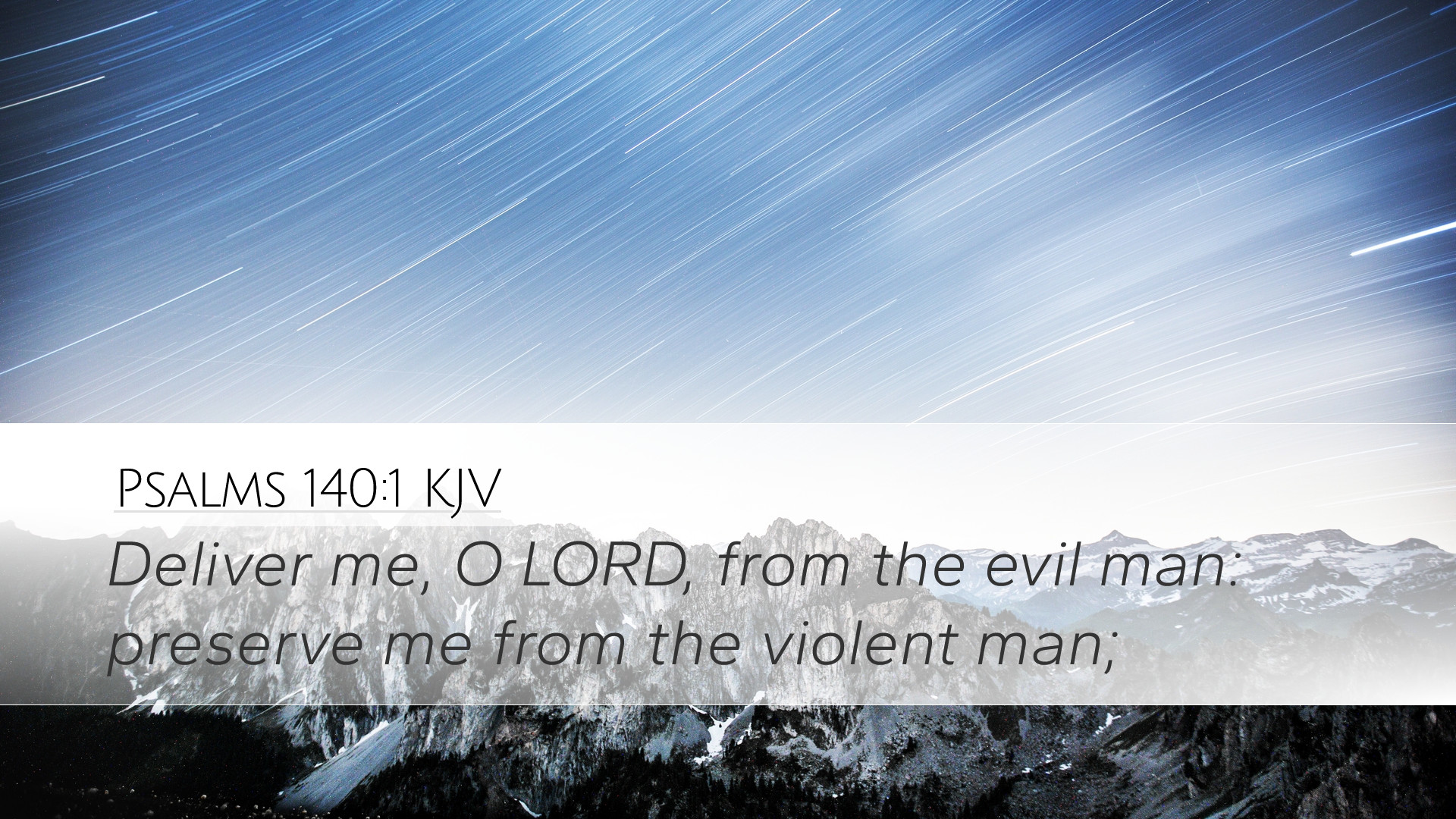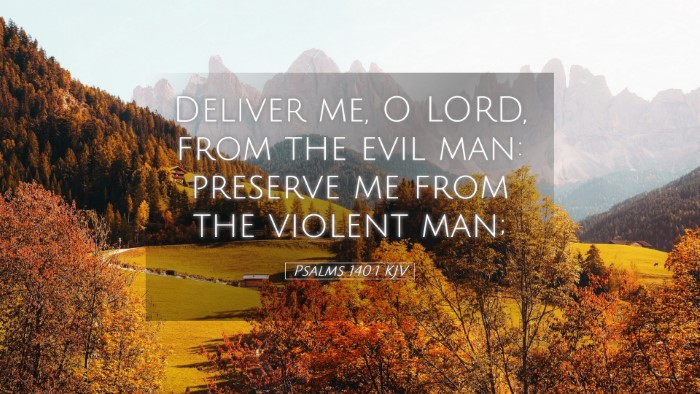Psalm 140:1 - Commentary
Verse: "Deliver me, O Lord, from the evil man: preserve me from the violent man."
Introduction
The plea for deliverance and protection from evil and violence encapsulated in Psalm 140:1 resonates deeply with believers facing trials. This verse serves not just as a prayer but as a profound acknowledgment of the realities of human wickedness and the need for divine intervention. In this commentary, various insights from public domain commentaries, including those of Matthew Henry, Albert Barnes, and Adam Clarke, are synthesized to provide a rich theological understanding of this crucial text.
The Context of the Psalm
Psalm 140 is attributed to David who finds himself under threat from malevolent individuals seeking to harm him. The psalm reflects a personal crisis that extends beyond individual experience, encapsulating the broader struggles of the faithful against unrighteousness.
Matthew Henry emphasizes the personal nature of the psalm, noting that it can be read in the context of both David's historical enemies and the spiritual adversaries faced by believers throughout history. He suggests that David’s enemies symbolize the broader evil in the world, making the prayer universally applicable.
Albert Barnes highlights that as David seeks divine deliverance, he is not only recognizing his vulnerabilities but also affirming God's sovereignty and capability to save. This invokes the notion that God’s protection is paramount amidst sheer violence and strife.
Understanding 'Evil Man' and 'Violent Man'
The terms “evil man” and “violent man” present a stark portrait of the psalmist's adversaries. The “evil man” denotes a broader category of wickedness characterized by moral depravity, while “violent man” specifically points to those who commit acts of physical aggression.
Adam Clarke expounds on these descriptors, noting that they indicate a willful opposition to righteousness, reflecting a defiance against God's laws. Clarke suggests that such figures embody rebellion, placing themselves in direct opposition to divine order.
Moreover, Henry posits that the existence of such individuals serves as a sobering reminder of the fallen state of humanity, reiterating the constant need for vigilance and reliance on God's power for safe passage in a world rife with danger.
The Theology of Deliverance
The cry for deliverance in this verse resonates with key theological principles. First, there is an inherent understanding of God as a deliverer, a central theme in Scripture that underscores His desire to rescue His people from peril.
Henry notes that in calling out for deliverance, David embodies a humble recognition of his reliance on God. This perspective is crucial as it places the believer’s trust not in their ability to evade danger but wholly in God’s protective hand.
Barnes also emphasizes the assurance that comes from a relationship with God, suggesting that such prayers are effective because they are grounded in faith. The acknowledgment of God’s power to deliver affirms His omnipotence and responsiveness to the needs of His people.
Practical Implications for Believers
Psalm 140:1 invites reflection on the practical realities of faith in a world fraught with malevolence. This text serves as both a personal prayer and a communal declaration of hope.
- Prayer and Supplication: The invocation for deliverance prompts believers to consistently engage in prayer, reaffirming their dependence on God in all circumstances.
- Acknowledgment of Evil: Recognizing the presence of evil in the world sensitizes believers to the spiritual battles at play, urging them to cultivate discernment and a spirit of vigilance.
- Trust in God’s Protection: The assurance of God’s deliverance encourages believers to remain hopeful, understanding that their ultimate safety lies in divine intervention.
Conclusion
Psalms 140:1 encapsulates a powerful petition for deliverance that resonates with the experience of believers throughout the ages. The insights from various commentaries highlight not only the immediate need for protection from malevolent forces but also the broader theological implications of trusting in God amidst adversity.
As pastors, theologians, and students engage with this verse, the foundational truths about divine providence, the nature of evil, and the necessity of prayer emerge as essential themes, offering a roadmap for navigating life’s challenges with faith and courage.


